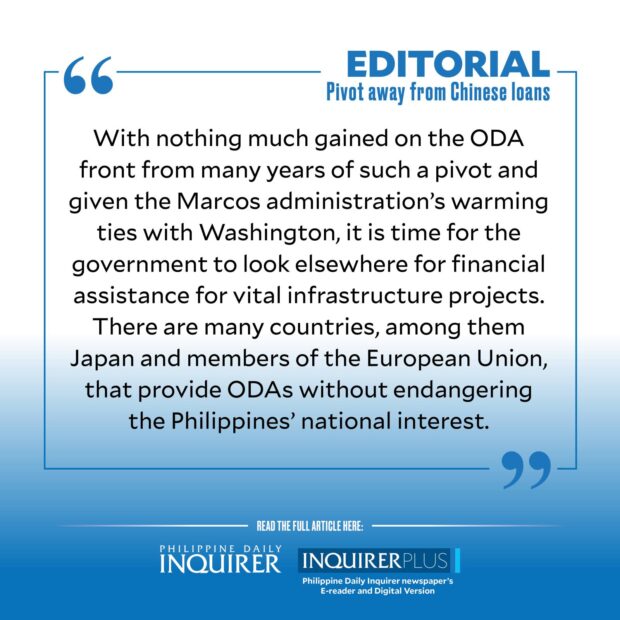Pivot away from Chinese loans

The decision of the government to quit negotiations on a concessional loan from China for the P83-billion first phase of the Mindanao railway project is the most prudent considering the souring relations between Manila and Beijing over the latter’s incursions in the West Philippine Sea.
Transportation Secretary Jaime Bautista last week disclosed that the government was looking at new financing options for the rail project after the Philippines backed out from the loan talks. The decision was contained in a letter sent by the Department of Finance to the Chinese Embassy last Sept. 22, noting that the Philippine government “is no longer inclined to pursue the Chinese ODA [official development assistance] financing for the Phase 1-Tagum-Davao-Digos segment” of the project. Bautista noted that the decision had nothing to do with the increasing tensions in the West Philippine Sea, only saying that negotiations with China were not advancing and “we’re now talking to other possible ODA partners.”
The bigger picture, however, belies this. Since taking office last year, President Marcos has revived the country’s relations with the United States, seeking not only much-needed investments, but also military assistance to help the Philippines defend its maritime territory. In his first year in office, the President has expanded the country’s mutual defense treaty with its long-time ally, visited Washington to sell the Philippines as an investment site, and told the world that “the future of the Philippines … will always have to involve the United States simply because [our] partnerships are so strong and so historically embedded in our common psyches.”
Article continues after this advertisementIt is no wonder then that China has not acted on the country’s request for ODA funding for key railway projects. The Mindanao venture is just one of three major railway projects whose loan negotiations with the China Export Import Bank since 2018 were overtaken by the change in the country’s leadership last year. Two of the projects advanced—the P142-billion Philippine National Railways South Long Haul project, also referred to as the PNR Bicol Express, awarded in January last year to a group led by China Railway Group Ltd. and the P51-billion Subic-Clark railway project earlier awarded to China Harbour Engineering Co. Ltd. in December 2020. However, the Tagum-Davao-Digos segment of the Mindanao project failed to proceed after China was unable to submit a shortlist of contractors.
On May 31, 2022, the loan applications for the three projects were automatically withdrawn “in deference to the incoming [Marcos] administration.” Upon assuming office in July last year, Mr. Marcos immediately directed the Department of Transportation to go back to the negotiating table, and the following month, Bautista announced that during his first official meeting with Chinese Ambassador to the Philippines Huang Xilian on Aug. 11, they agreed to resume funding talks. Still the discussions did not prosper.
Separating economic ties with geopolitical relations may be true in some areas such as trade. China will continue buying nickel ore and agricultural products from the Philippines because it needs these, and the Philippines will continue importing steel and petroleum products from China because the country is in short supply of such items. But in the ODA world, the lender always has the upper hand over the borrower. These low-interest, long maturity loans not only from China but also from developed countries such as the United States, Japan, and many European countries have conditions attached to them. China’s loans are also seen to have highly onerous terms that would be inimical to the country’s interest.
Article continues after this advertisementTo believe that Beijing’s inaction on the country’s ODA requests has nothing to do with the tensions in the West Philippine Sea is absurd. Countries with excess funds dangle ODAs to win friends. While officials from both countries insist that economic relations should not be affected by the maritime dispute, China’s inaction on the loans disproves this. With the “word war” between Manila and Beijing due to China’s frequent incursions into the country’s internationally recognized exclusive economic zone based on a unilateral historical claim, the Philippines simply cannot be seen as a friend deserving of its ODAs.
Following former president Rodrigo Duterte’s pivot to China during his term, China has promised to provide billions of dollars in investments and concessional loans. But with nothing much gained on the ODA front from many years of such a pivot and given the Marcos administration’s warming ties with Washington, it is time for the government to look elsewhere for financial assistance for vital infrastructure projects. There are many countries, among them Japan and members of the European Union, that provide ODAs without endangering the Philippines’ national interest. Scuttling loan talks on the Mindanao railway project is thus a good start in this direction.
















